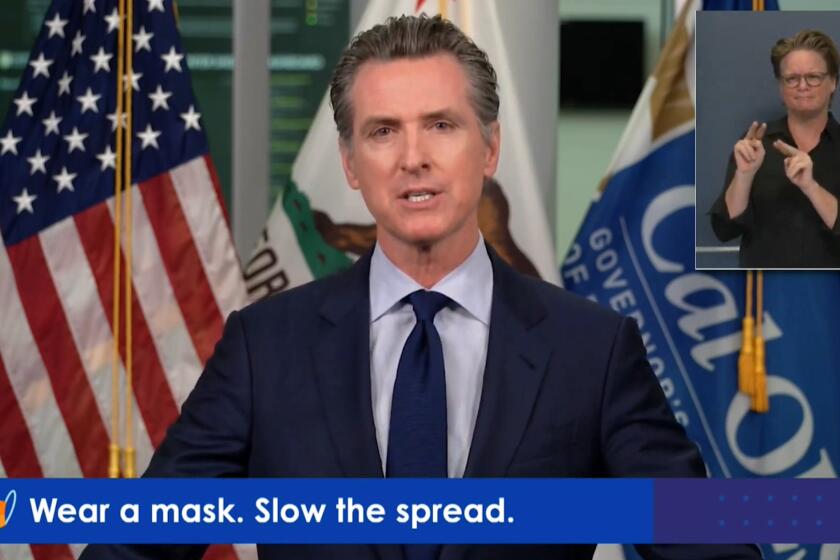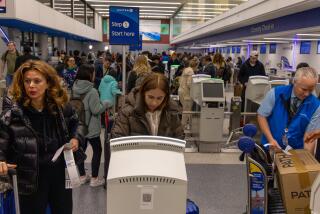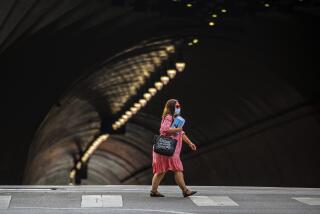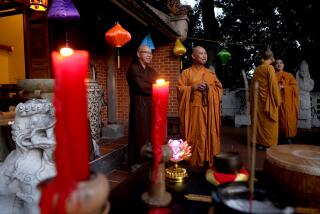California officials oppose CDC over looser coronavirus testing and travel protocols
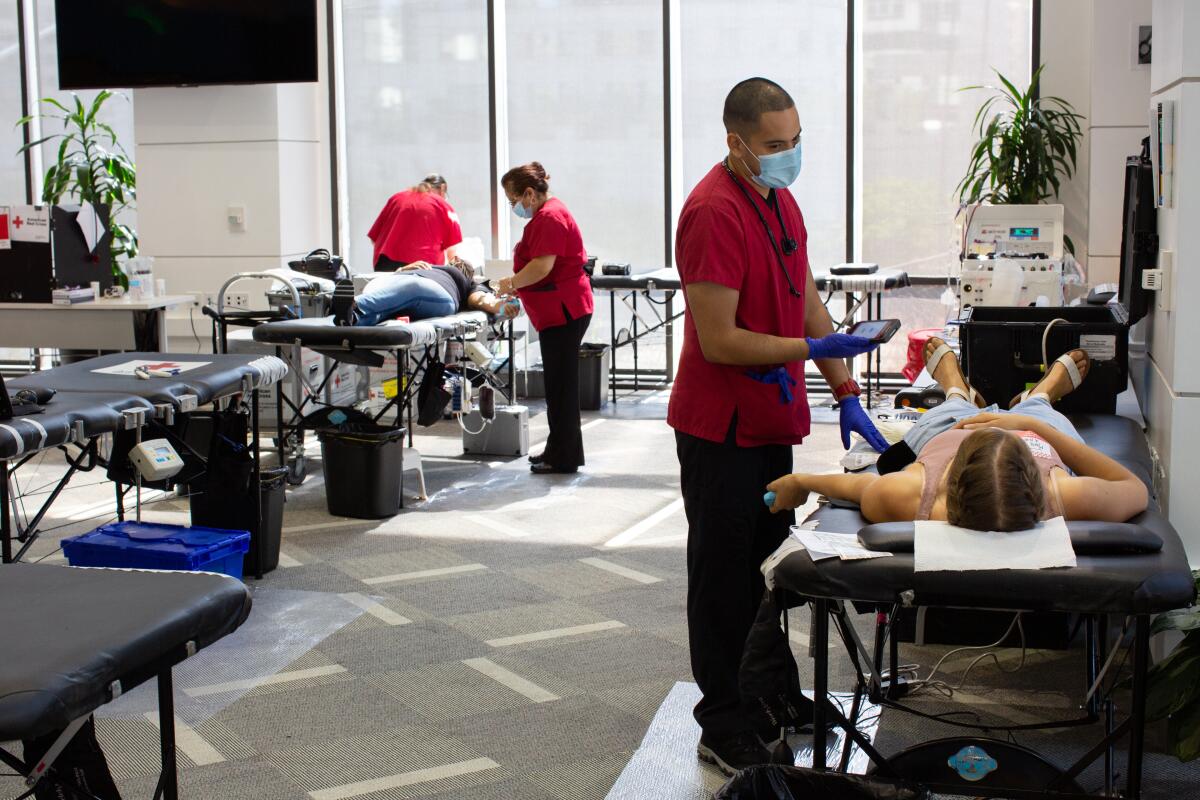
- Share via
New guidance on coronavirus testing and travel issued by the Centers for Disease Control and Prevention drew strong pushback from California officials Wednesday.
The CDC is no longer recommending a 14-day quarantine for travelers. After the government issued a mandatory quarantine for travelers arriving in the U.S. from Wuhan, China, in February, the guidance that travelers isolate for two weeks was adopted by several states and encouraged by local officials as a key tool in mitigating the spread of the novel coronavirus — especially among people who may be asymptomatic.
Gov. Gavin Newsom on Wednesday said he disagrees with the CDC’s new guidance and insisted that it will not impact California.
“I don’t agree with the new CDC guidance. Period. Full stop,” he said. “We will not be influenced by that change.”
Los Angeles County Public Health Director Barbara Ferrer said those traveling to places with high transmission rates should be mindful of the potential to contract the virus and expose others to it. She also reminded residents that L.A. County is a COVID-19 hot spot and traveling from the community could present a risk to outsiders.
“My message really is: Whether you’re flying or staying home, you need to be mindful that we have to reduce our transmission,” she said. “The way we do that is by reducing exposure to other people.”
The CDC also is no longer advising those without symptoms to be tested, even if they have been in contact with an infected person. Ferrer, however, said the county’s recommendation still stands: Anyone who has been exposed to someone with the virus should get tested and self-quarantine.
“This is particularly important if a public health official or doctor tells you to get tested,” she said.
Newsom said Wednesday that California had signed a contract with an East Coast medical diagnostics company to more than double the number of coronavirus tests that can be processed in the state, eventually expanding capacity to roughly a quarter of a million tests a day.
Under the $1.4-billion agreement, a new Santa Clarita lab will be able to provide testing results within two days, far quicker than the average five- to seven-day processing times offered by other labs.
The expanded testing capacity and quicker results will increase the ability of health officials to quickly isolate people who test positive for the virus and to track down and test those who came in contact with them, Newsom said, steps that are crucial to slowing the spread of COVID-19.
The new lab is expected to begin processing coronavirus tests in November. When the lab is at full capacity in March and processing as many as 150,000 tests per day, the cost per test is expected to be a little more than $30, Newsom said. Medicare and Medi-Cal pay about $100 per test, and the average overall cost varies from $150 to $200 per test, state officials said.
Reducing testing costs not only will save money for workers and their employers but also lower costs for Medi-Cal, the federally subsidized insurance program for low-income Californians, the governor said.
“This is exactly what the federal government should be doing,” Newsom said. “Had the federal government done this some time ago, you wouldn’t see average costs [per] test at $150 to $200 — costing the taxpayers, quite literally, tens of billions of dollars, costing employers billions and billions of dollars, costing the health plans billions of dollars as well.”
The expanded coronavirus testing capacity and quicker results will increase the ability of officials to quickly isolate people who test positive and to track down those who came in contact with them, California Gov. Gavin Newsom said.
The news comes as California fights to keep its case count and hospitalization numbers down. The state’s 14-day average for positive tests is at 6.1%, and hospitalizations over that same period have decreased by 17%, Newsom said Wednesday.
In L.A. County, officials reported 58 additional COVID-19 deaths Wednesday and 1,642 additional cases. Those numbers are lower than what was reported just a month ago, but higher than Tuesday’s daily case count, which dipped below 1,000 for the first time since early June.
The drop in infections was reported the same day that the California Department of Public Health reported the county’s 14-day average case rate had dropped below 200 per 100,000 residents. That threshold would allow elementary schools to apply for waivers to hold in-person classes, but on Wednesday, Ferrer said the county is not ready to make that move.
Officials also reported that 1,200 pregnant women and girls between the ages of 14 and 52 have tested positive for the virus and two have died from complications. Of the 193 babies who were tested at birth, eight were positive. This marks the first time the county has reported positive infections among newborn babies.
The number of cases in L.A. County, which totals more than 233,000, surged in June after the county rapidly reopened various sectors of the economy following several months of closures. Activity related to Memorial Day weekend and informal gatherings also contributed to an increase in cases throughout the state.
In addition, mass protests over the death of George Floyd erupted during that time, although officials have said that those outdoor demonstrations did not contribute to the massive surge in new coronavirus infections. Still, it is impossible for officials to trace cases that originate in public spaces.
The statewide surge in cases continued after the July 4 weekend, followed by a reporting backlog error that sent daily infections into record territory.
Those numbers have just begun to decline in recent weeks, as has the number of hospitalizations in California.
The state’s seven-day average for positive coronavirus test results is 5.7%. That is below the country’s overall average, which according to Johns Hopkins University is 6.1%.
But maintaining that progress is not guaranteed if social distancing practices are relaxed, officials warn. In an effort to continue slowing the spread of the virus, some counties are offering to pay workers to stay home and isolate if they contract the virus.
Sacramento County health officials are working on a proposal to offer a stipend of about $12.50 per hour to workers who contract the virus but cannot work from home. The payout amounts to about $1,000 for two weeks.
Eight California counties have slowed the spread of the coronavirus but are unable to reopen businesses until Gov. Gavin Newsom releases new guidelines.
Los Angeles County, which accounts for the bulk of the state’s more than 682,000 infections and nearly 12,500 deaths, has not introduced any wage-replacement plans similar to those in the Bay Area. But the county is offering residents who complete an interview with a contact tracer a $25 gift certificate.
More to Read
Sign up for Essential California
The most important California stories and recommendations in your inbox every morning.
You may occasionally receive promotional content from the Los Angeles Times.
